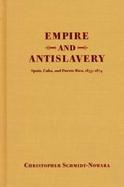Empire and Antislavery: Spain, Cuba, & Puerto Rico, 1833-1874
- List Price: $50.00
- Binding: Hardcover
- Publisher: University of Pittsburgh Press
- Publish date: 04/01/1999
Nonetheless, people throughout the Spanish empire fought to abolish slavery, including the Antillean and Spanish liberals and republicans who founded the Spanish Abolitionist Society in 1865.The Society met massive conservative resistance in Spain and the Antilles, yet ultimately forced major changes in the imperial order. This book is an extensive study of the origins of the Abolitionist Society and its role in the destruction of Cuban and Puerto Rican slavery and the reshaping of colonial politics.
Christopher Schmidt-Nowara builds his narrative around three pivotal moments. The first is the decade of the 1830s when Spanish revolutionaries consolidated a new imperial order that reconciled liberal institutions in the metropolis with slavery and nonrepresentative rule in the Antilles, provoking important criticisms of slavery, racial conflict, and Spanish rule from members of colonial society. The second focal point is the Liberal Union (1854-1868), a period that witnessed dramatic transformations in both the Spanish and the imperial public spheres, setting the stage for antislavery mobilization and new transatlantic political alliances. Finally, Empire and Antislavery analyzes the Abolitionist Society's challenge to colonial slavery made inthe aftermath of the Spanish and Cuban revolutions of 1868.
Based on research in Spain, Cuba, Puerto Rico, and the United States, Empire and Antislavery carefully reconstructs how abolitionism arose as a critique of the particular structures of capitalism and colonialism in Spain and the Antilles. More generally, it tells a story central to the understanding of slavery, race, and empire in the Atlantic world.


